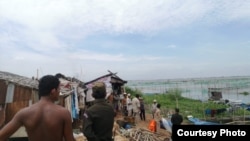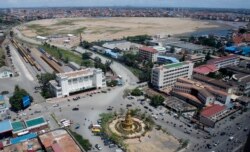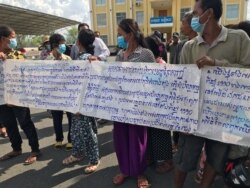Urban land rights NGO Sahmakum Teang Tnaut released a research document on Monday showing a slowdown in land evictions in the capital, but said there was little evidence the process was improving or following human rights standards.
The document, released by Sahmakum Teang Tnaut (STT) and titled “Eviction and Relocation,” provides statistics on all reported land evictions in Phnom Penh since the 1990s.
Pointing to recent evictions conducted in the last three months at Boeung Chhouk A, Boeung Samrong, and Boeung Tamok, STT’s report shows little improvement in local authorities' conduct while dealing with communities slated for eviction.
“Impoverished Cambodian families continue to be evicted despite the Covid-19 pandemic making families vulnerable to sickness and extreme poverty,” read the report’s press release.
Phnom Penh had been mired in a slew of land disputes, emanating from the local government’s handing over of land to private interests, in many cases, often to the detriment of communities and residents. This includes the forced eviction of families from Dey Krahorm, Boeung Kak Lake, and Borei Keila.
Local law enforcement has in the past responded violently to communities protesting these evictions, with land rights activists and advocates often facing arrest, detention, and intimidation.
Starting from before 1999, STT reported there had been 68 evictions within Phnom Penh, with 50 of these communities receiving some form of relocation from the state. A majority of evictions, around 42, were linked to the alleged occupation of public state land, and nine were evictions carried out by development companies who had been given state land.
Around 29 of these communities had been given 90 or fewer days before the eviction, the report reads, a human rights standard for such actions. Nine of the evictions involved violence from state forces, seven of which affected women and children.
STT’s documentation showed that women often bore the brunt of evictions, undergoing long stretches of stress and trauma, some even blaming themselves for their family’s poor conditions. Relocation sites also provided women with little access to bathrooms and privacy, with others reporting that they feared rape and assault at these locations.
Indebtedness was very high among these communities STT studied, with an estimate suggesting that 17 communities had 91 percent or more households with some form of debt.
Highlighting recent evictions, STT reported that authorities deployed bulldozers to Boeung Chhouk A community in northern Phnom Penh on June 20, 2020. Only a few families had been consulted before the eviction. The remaining households were then given a 15-day notice for the eviction, again well short of the 90 days that human rights guidelines on evictions.
On 24 April 2020, authorities again brought a bulldozer to a site in Boeung Samrong in Russey Keo district, where 18 families live. According to STT, families claimed they owned the land since 1979, with authorities disputing this by calling the land state property.
Soeung Saran, executive director of STT, said the authorities routinely didn’t explain the exact reasons for eviction and in other cases provided no consultation at all.
“The government, especially City Hall should conduct the proper consultations and provide suitable compensation for villagers who are affected,” he said.
“When they are evicted, they are told they live on the state land,” he said. “But after eviction, the land is given to a private group or company. Villagers are then wondering how that happened.”
Touch Sam On, a 57-year-old villager living in Boeung Chhouk village at Russey Keo district, said his house was slated to be demolished soon, but that he contested the eviction and demolition. He added that he has lived on the land since 1995 and disputed claims that he was occupying the land illegally.
“They have the plan to bulldoze the houses and evict us like animals. It is unacceptable,” he said.
If evicted, Touch Sam On said he would have to rent a new home, which he was afraid he could not afford because he was expected to pay $400 a month for a loan.
Russey Keo District Governor Chea Pisey refused to comment on the report, directing queries to Phnom Penh City Hall. Municipality spokesperson Meth Measpheakdey could not be reached for comment on Monday.
Ministry of Land Management spokesperson Seng Lout also refused to comment about the report or the recent evictions, asking reporters to contact district governments for comment.
“I have not received any information about the eviction. If [you] hear from anyone, you can ask from that [person],” he said.
According to STT, since the 1980s, Phnom Penh has witnessed the eviction and relocation of more than 50 communities, totaling around 9,832 families and more than 40,000 people. The rights group said most of these communities had suffered trauma and continue to suffer as a result of the flawed processes used by the local and national government.










